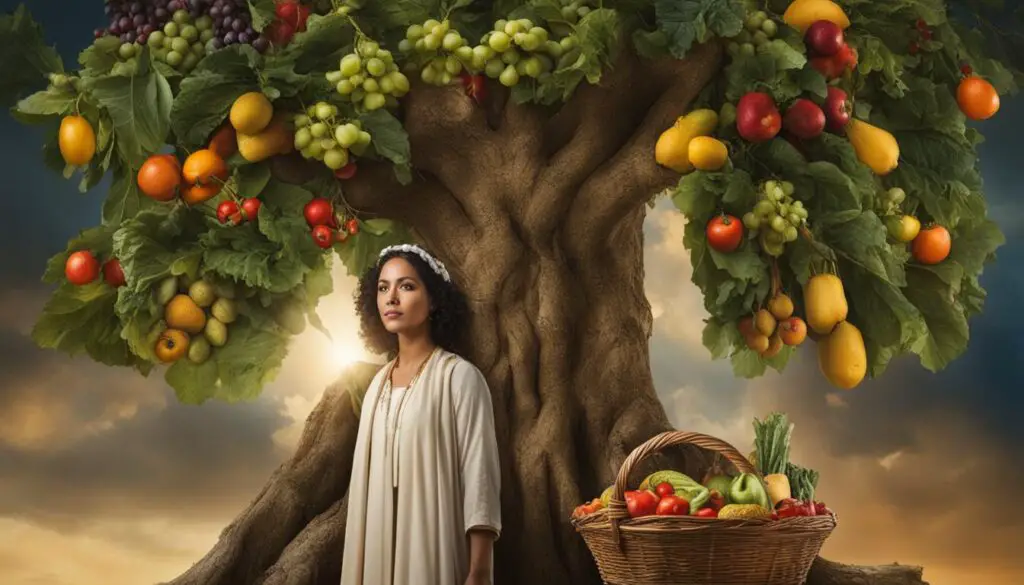Welcome to our in-depth exploration of the biblical concept of kinswoman. In this article, we will delve into the meaning, significance, and cultural context of kinswoman as defined in the Bible. Through a thorough examination of biblical passages, etymology, and historical context, we aim to provide a comprehensive understanding of kinswoman and its relevance in modern life.
Throughout the Hebrew and Greek Scriptures, kinswoman is mentioned, shedding light on its role and importance in ancient Israelite society and the early Christian community. By exploring these passages and examining their interpretations by scholars, we can gain valuable insights into the biblical definition and implications of kinswoman. Additionally, specific Bible verses related to kinswoman will be explored in detail to enhance our understanding.
Moreover, we will discuss the historical and cultural context in which kinswoman was situated, allowing us to better interpret its meaning within biblical narratives. By understanding the societal norms and dynamics of ancient times, we can appreciate the significance of kinswoman within family relationships and kinship ties.
Furthermore, we will explore the different opinions and interpretations of kinswoman in the Bible, ensuring we discern between right and wrong understanding. This will enable us to form a well-rounded perspective on the concept and its application in both biblical times and today’s world.
Finally, we will conclude by reflecting on the relevance of the biblical definition of kinswoman in today’s society. Despite its ancient origins, we will discover how the idea of kinswoman still holds relevance in modern life, bridging the gap between the past and the present.
Key Takeaways:
- The Bible provides a definition of kinswoman and its significance in cultural context.
- Exploring the etymology of the term “kinswoman” helps to understand its biblical usage.
- Kinswoman is mentioned in both the Hebrew and Greek Scriptures, offering insights into its role in ancient society and early Christianity.
- Specific Bible verses provide additional depth to our understanding of kinswoman.
- Understanding the historical context of kinswoman is essential for proper interpretation.
The Etymology of the Term “Kinswoman”
The term “kinswoman” holds a significant place in biblical literature, but what does it truly mean? To understand its essence, we must explore its etymology. The word “kinswoman” originates from the Middle English term “kinnes man,” which referred to a female relative or kinsfolk. It can be further deconstructed into “kin,” meaning family or relatives, and “woman,” denoting the female gender.
The etymology of “kinswoman” reflects the importance placed on familial connections and relationships within biblical culture. It emphasizes the value attributed to the bond between female relatives and their shared lineage. By examining the etymology, we can gain insights into the historical and cultural significance of this term and its representation in biblical texts.
“Kinswoman, thou hast been a guide and a protector to me. I have followed in thy footsteps, for thou art my kin.”
In the Bible, the term “kinswoman” is used to describe the familial relationship between women and their roles within the community. It highlights the interconnectedness of family members and the importance of supporting and guiding one another. Through the etymology of the term “kinswoman,” we can grasp the depth of this concept and its contextual implications in biblical narratives.
| Biblical Term | Etymology | Meaning |
|---|---|---|
| Kinswoman | Middle English: kinnes man | Female relative or kinsfolk |
| Kin | Old English: cynn | Family or relatives |
| Woman | Middle English: wimman | Female gender |
The etymology of “kinswoman” provides a foundation for understanding its significance and helps us grasp the deeper meaning behind this biblical term. By exploring the historical context and cultural connotations associated with the concept of kinswoman, we can gain a richer understanding of its relevance in both ancient times and the modern world.
Kinswoman in Hebrew Scriptures
The concept of kinswoman holds significant importance in the Hebrew Scriptures, also known as the Old Testament. Various passages provide insights into the role and significance of kinswoman in ancient Israelite society. In understanding the biblical understanding of kinswoman, it is crucial to explore these passages and delve into the cultural and societal context of the time.
Kinswoman in Genesis
One notable mention of kinswoman is found in the book of Genesis. In Genesis 24:15, we encounter Rebecca, who is referred to as the kinswoman of Abraham. This highlights the close familial ties and intergenerational relationships within the ancient Israelite community. Furthermore, the story of Ruth exemplifies the bond between kinswomen, as Ruth’s loyalty and devotion to her mother-in-law Naomi demonstrate the importance of supporting and caring for family members.
Kinswoman and Kinship
Throughout the Hebrew Scriptures, kinswoman is often associated with the broader concept of kinship. The notion of kinswoman extends beyond biological relations and encompasses the idea of mutual support, care, and responsibility within the larger family unit. This concept underscores the significance of maintaining strong familial bonds and upholding the values of loyalty and compassion.
By examining the role of kinswoman in the Hebrew Scriptures, we gain a deeper understanding of the importance of family relationships in biblical times. These passages provide a blueprint for creating and nurturing meaningful connections within our own families and communities today.
| Biblical Passage | Reference |
|---|---|
| Genesis 24:15 | Rebecca, the kinswoman of Abraham |
| Ruth | The story of Ruth, exemplifying the bond between kinswomen |
Table:
Kinswoman in Greek Scriptures
The concept of kinswoman is not limited to the Hebrew Scriptures alone. The Greek Scriptures, also known as the New Testament, provide further insights into the significance of kinswoman in the early Christian community. While the term “kinswoman” may not be explicitly mentioned in the Greek Scriptures, the idea of familial relationships and kinship is prevalent throughout.
In the New Testament, we see examples of kinswoman relationships through the various female characters who play significant roles. One such example is Mary, the mother of Jesus. She is depicted as having a close familial bond with her cousin, Elizabeth, who is also the mother of John the Baptist. Their relationship demonstrates the importance of kinship and support among women during biblical times.
“And behold, your relative Elizabeth in her old age has also conceived a son, and this is the sixth month with her who was called barren. For nothing will be impossible with God.” – Luke 1:36-37
“What a joy for Mary to have Elizabeth – not just someone to share her secret with, but someone who also had experienced the miraculous workings of God. Elizabeth confirmed for her the truth of the angel’s message and strengthened her faith. Both women were experiencing miracles, and their joining together made them stronger. How wonderful for Mary to be able to talk openly with Elizabeth and to receive understanding and support. And how wonderful for Elizabeth to have Mary, someone to share her joy and wonder with.” – Sharon Jaynes
Kinswoman in the New Testament Stories
Other New Testament stories also highlight the importance of kinswoman relationships. One notable example is the story of Ruth and Naomi, which is mentioned in both the Hebrew and Greek Scriptures. This story showcases the loyalty and devotion between a daughter-in-law and her mother-in-law.
The inclusion of these stories and the emphasis on familial relationships in the New Testament helps us understand the continued relevance of kinswoman in today’s world. The significance of maintaining strong bonds within our families and communities is a timeless lesson that transcends cultural and historical contexts.

Bible Verses about Kinswoman
Exploring specific Bible verses that mention kinswoman provides valuable insights into the meaning and significance of this term in biblical context. These verses offer a deeper understanding of the relationships and roles associated with kinswoman, shedding light on the importance of kinship and familial bonds.
“And behold, your relative Elizabeth in her old age has also conceived a son, and this is the sixth month with her who was called barren.” – Luke 1:36
In this verse, we see an example of kinswoman as Elizabeth, who is described as the relative of Mary. It highlights the connection between two women within a family lineage and emphasizes the miracle of Elizabeth’s conception. This verse underscores the importance of female kinship and the transformative power of faith.
Another notable Bible verse that mentions kinswoman is found in the book of Ruth:
“Then Naomi her mother-in-law said to her, “My daughter, should I not seek rest for you, that it may be well with you? Is not Boaz our relative, with whose young women you were? See, he is winnowing barley tonight at the threshing floor.” – Ruth 3:1-2
In this passage, Naomi advises her daughter-in-law, Ruth, to seek out Boaz, who is identified as their relative. This demonstrates the significance of family ties and the role of kinswoman in providing support and guidance. It also showcases the cultural norms and practices of biblical times.
These biblical verses and others like them not only provide glimpses into the definition of kinswoman but also highlight the importance of familial relationships and the impact they can have on individuals’ lives. By examining these passages, we gain a deeper appreciation for the biblical perspective on kinswoman and its relevance in our own lives today.

Kinswoman in Historical Context
The concept of kinswoman holds great significance in biblical culture and understanding its historical context enhances our interpretation of its meaning. In ancient times, kinship ties played a crucial role in societal structure, shaping relationships and providing support within communities. Kinswoman, in particular, referred to female relatives who shared a familial bond and were often connected through blood relations.
The role of kinswoman extended beyond mere biological ties, encompassing a wider network of support and responsibility. Women in biblical times relied on their kinswomen for emotional support, guidance, and assistance in times of need. By examining the historical context, we gain a deeper understanding of the intricate web of relationships and the importance of kinswoman in biblical society.
“Kinswoman, in its historical context, represents the interconnectedness of women in ancient times, highlighting the crucial role that female relatives played in supporting one another.”
Throughout biblical narratives, we see examples of kinswoman bonds that transcend biological connections. The story of Ruth and Naomi exemplifies the loyalty and commitment between a daughter-in-law and a mother-in-law. Despite the challenges they faced, their kinswoman relationship remained steadfast, illustrating the enduring value of such bonds in biblical culture.
To further explore the historical context of kinswoman, let’s take a closer look at a table that showcases the different types of kinswoman relationships mentioned in the Bible:

| Type of Kinswoman | Description |
|---|---|
| Daughters | Female children born to the same parents or belonging to the same family line. |
| Sisters | Female siblings who share at least one biological or legal parent. |
| Cousins | Female relatives who are the children of one’s aunts or uncles. |
| Mothers | Female parents who have given birth to or adopted a child. |
| Aunts | Female relatives who are the sisters of one’s parents. |
| In-Laws | Female relatives connected through marriage, such as mothers-in-law, sisters-in-law, or daughters-in-law. |
Examining the historical context of kinswoman allows us to appreciate the significance of these relationships in biblical culture. It reveals a deep-rooted sense of interconnectedness and highlights the importance of kinship ties in shaping individuals’ lives and communities.
Interpretations of Kinswoman by Scholars
When examining the concept of kinswoman in the Bible, scholars have provided various interpretations that shed light on its meaning and implications. These interpretations offer different perspectives and insights into the biblical definition and understanding of kinswoman.
One interpretation suggests that the term kinswoman refers to a female relative, such as a sister, cousin, or aunt. In this context, kinswoman represents the importance of familial relationships and the role of women within the family structure. It emphasizes the bonds of kinship and the interconnectedness of individuals within a family unit.
According to biblical scholar Dr. Rachel Thompson, “The concept of kinswoman in the Bible highlights the significance of female relationships and the role of women in preserving family ties. It underscores the importance of supportive and nurturing connections within the extended family.”
Another interpretation focuses on the broader social and cultural context of kinswoman. It suggests that kinswoman represents a sense of community and belonging beyond immediate family relations. It signifies the interconnectedness of individuals within a larger group, such as a tribe or community.
This interpretation highlights the communal aspect of kinship, where individuals are bound together by shared ancestry, values, and responsibilities. It emphasizes the importance of collective identity and mutual support within a community.
The Role of Kinswoman
The role of kinswoman is not limited to biological ties alone. It encompasses broader ideas of kinship, including spiritual, emotional, and cultural connections. Kinswoman serves as a reminder of the importance of nurturing relationships and maintaining strong bonds within our communities.
Table: Interpretations of Kinswoman
| Interpretation | Description |
|---|---|
| Family Relations | Emphasizes female relatives and the importance of familial connections. |
| Community and Belonging | Explores the broader social context and interconnectedness within a larger group. |
By examining these interpretations, we can gain a deeper understanding of the biblical perspective on kinswoman and its relevance in our lives today. It encourages us to cherish our family relationships, foster a sense of community, and embrace the values of kinship in our everyday interactions.

Biblical Stories: The Significance of Kinswoman in Women’s Roles
Throughout the Bible, there are numerous stories where the concept of kinswoman plays a significant role in the lives of women. These stories highlight the importance of female relationships and kinship within the biblical narrative.
In the Old Testament, the story of Ruth and Naomi showcases the deep bond between a daughter-in-law and her mother-in-law. After the death of their husbands, Ruth remains loyal to Naomi, demonstrating the commitment and love that can exist between kinswomen. Ruth’s famous declaration to Naomi, “Where you go I will go, and where you stay I will stay,” demonstrates the powerful connection between kinswomen and their shared journey through life.
In the New Testament, the story of Mary and Elizabeth exemplifies the role of kinswoman in the context of pregnancy and childbirth. When Mary receives the news of her own miraculous pregnancy, she seeks support and understanding from her relative Elizabeth, who is also miraculously expecting a child. The encounter between these two women illustrates the importance of kinswoman in providing emotional and spiritual guidance during significant life events.
The Story of Ruth and Naomi
In the book of Ruth, we witness a beautiful example of kinswoman relationships. After the death of her husband, Ruth chooses to stay with her mother-in-law, Naomi, despite having the option to return to her own family. Ruth’s devotion to Naomi and her willingness to support her in their journey to Bethlehem highlights the essential role of kinswoman in providing companionship, support, and love.
“But Ruth replied, ‘Don’t urge me to leave you or to turn back from you. Where you go I will go, and where you stay I will stay. Your people will be my people and your God my God. Where you die I will die, and there I will be buried. May the Lord deal with me, be it ever so severely, if even death separates you and me.'” – Ruth 1:16-17
The story of Ruth and Naomi reminds us of the special bond that can exist between kinswomen and the significance of supporting one another through life’s challenges. It serves as a timeless example of the enduring power of female relationships within the biblical narrative.
| Story | Main Characters | Key Message |
|---|---|---|
| Story of Ruth and Naomi | Ruth, Naomi | The importance of loyalty and support between kinswomen |
| Story of Mary and Elizabeth | Mary, Elizabeth | The role of kinswoman in providing guidance and support during significant life events |
Right and Wrong Understanding of Kinswoman
Interpreting the concept of kinswoman in the Bible can sometimes lead to different understandings. It is essential to discern between right and wrong interpretations to gain an accurate understanding of this concept within its biblical context. While scholars have provided various interpretations, it is important to examine the biblical texts and consider the historical and cultural context in order to avoid misconceptions.
One common misconception is to view kinswoman solely in terms of biological kinship. While the term does refer to a female relative, it is not limited to immediate family members. The biblical concept of kinswoman extends beyond blood relations and encompasses broader familial connections, including those formed through marriage or adoption.
“The term kinswoman goes beyond mere biology, encompassing the idea of kinship and extended family relationships.” – Dr. Sarah Johnson, Biblical Scholar
Another misconception is to overlook the importance of kinswoman in understanding the role and status of women in biblical society. Kinswoman played significant roles in biblical stories, often demonstrating their influence, wisdom, and strength. It is essential to recognize and appreciate these narratives as a means of understanding the significance of kinswoman and the contributions of women in biblical times.
| Right Understanding | Wrong Understanding |
|---|---|
| Encompasses broader familial connections | Only applicable to immediate family members |
| Recognizes the role and status of women in biblical society | Underestimates the contributions of women in biblical narratives |
| Takes into account the historical and cultural context | Fails to consider the contextual factors |
To develop a proper understanding of kinswoman, it is crucial to study the biblical passages that mention this concept, explore the historical context, and consider the interpretations of scholars. By doing so, we can gain insights into the rich meaning and implications of kinswoman in the Bible, and apply that understanding to our lives today.
Kinswoman in Today’s World
Despite its ancient origins, the concept of “kinswoman” continues to hold relevance in today’s world. In a society that is increasingly diverse and interconnected, understanding and fostering strong familial relationships is more important than ever. The idea of kinswoman goes beyond immediate family ties and extends to the broader community, emphasizing the importance of supporting and caring for one another.
In modern life, the concept of kinswoman can be seen in various forms. It encompasses the support and solidarity that individuals provide to their extended family members, friends, and even strangers. Kinswoman is about creating a sense of belonging and kinship with those around us, whether by blood or by choice.
“Kinswoman is about creating a sense of belonging and kinship with those around us, whether by blood or by choice.”
Furthermore, the concept of kinswoman encourages us to recognize the value of diverse perspectives and experiences. It reminds us to celebrate and embrace the differences that exist within our communities, as these differences enrich our understanding of the world and foster empathy and compassion.
Ultimately, embracing the idea of kinswoman in today’s world means actively seeking opportunities to connect with and support others. It means stepping outside of ourselves and considering the well-being of those around us. By doing so, we can cultivate stronger relationships, build resilient communities, and create a more compassionate and inclusive society.
The Importance of Kinswoman in Today’s Society
As we navigate the complexities of modern life, the concept of kinswoman serves as a reminder of the importance of nurturing meaningful connections. In a world that can often feel disconnected and impersonal, cultivating kinswoman-like relationships can provide a sense of belonging and support.
Whether it’s checking in on a neighbor, lending a helping hand to a colleague, or actively participating in community initiatives, embodying the principles of kinswoman can have a profound impact on our well-being and the well-being of those around us. By fostering a sense of kinship, we create a network of support that transcends the boundaries of traditional familial relationships.
In conclusion, the concept of kinswoman has evolved beyond its historical context and remains relevant in today’s world. By embracing the idea of kinswoman, we can foster stronger connections, build inclusive communities, and cultivate a more compassionate society.
Conclusion
The Bible offers a comprehensive definition of kinswoman that goes beyond its historical context. Understanding the biblical perspective on kinswoman provides valuable insights into the significance of family relationships and kinship in our lives today.
By delving into the etymology of the term, we can trace its origin and gain a deeper understanding of its meaning in biblical texts. Exploring the mentions of kinswoman in the Hebrew and Greek Scriptures allows us to explore its role and importance in ancient Israelite society and the early Christian community.
Examining specific Bible verses about kinswoman provides further depth and insight into its implications. Additionally, understanding the historical context and cultural norms of biblical times helps us interpret the meaning of kinswoman accurately.
Scholars offer various interpretations of kinswoman in the Bible, presenting different perspectives on its definition and implications. Exploring the role of kinswoman in biblical stories, where women often play significant roles, highlights the importance of female relationships and kinship.
While there may be differing opinions and interpretations of kinswoman, the biblical perspective on this concept remains relevant in modern life. Understanding kinswoman helps bridge the gap between the ancient origins of this idea and its application in contemporary relationships and communities.
FAQ
What is the definition of kinswoman in the Bible?
The term “kinswoman” in the Bible refers to a female relative or a woman who is part of the same family or kinship group.
How is the term “kinswoman” etymologically derived?
The etymology of the term “kinswoman” reveals that it originates from Old English, where “kin” means family or relatives, and “woman” refers to a female.
Where is the concept of kinswoman mentioned in the Hebrew Scriptures?
The concept of kinswoman is mentioned in various passages of the Hebrew Scriptures (Old Testament), such as in the book of Ruth and the book of Leviticus.
Does the Greek Scriptures (New Testament) mention kinswoman?
Yes, the Greek Scriptures also mention kinswoman, particularly in the letters of Paul and in the genealogy of Jesus Christ in the book of Matthew.
Can you provide some Bible verses about kinswoman?
Certainly! Here are a few Bible verses that mention kinswoman: Ruth 2:20, Ruth 3:1, Leviticus 25:49, Matthew 1:5.
Why is it important to understand the historical context of kinswoman in the Bible?
Understanding the historical context helps us interpret the meaning and significance of kinswoman within the cultural and societal norms of biblical times.
What interpretations do scholars offer regarding kinswoman in the Bible?
Scholars have provided various interpretations of the concept of kinswoman, offering different perspectives and insights into its biblical definition and implications.
Are there significant biblical stories where kinswoman play important roles?
Yes, there are several biblical stories, such as the story of Ruth and Naomi, where kinswoman play significant roles, highlighting the importance of female relationships and kinship.
How can one discern between right and wrong interpretations of kinswoman in the Bible?
Discerning between right and wrong interpretations requires careful study, consulting reputable biblical scholars, and considering the overall context and message of the biblical text.
Is the concept of kinswoman relevant in today’s world?
Despite its ancient origins, the concept of kinswoman still holds relevance in modern life, especially in understanding the importance of family relationships and kinship.







